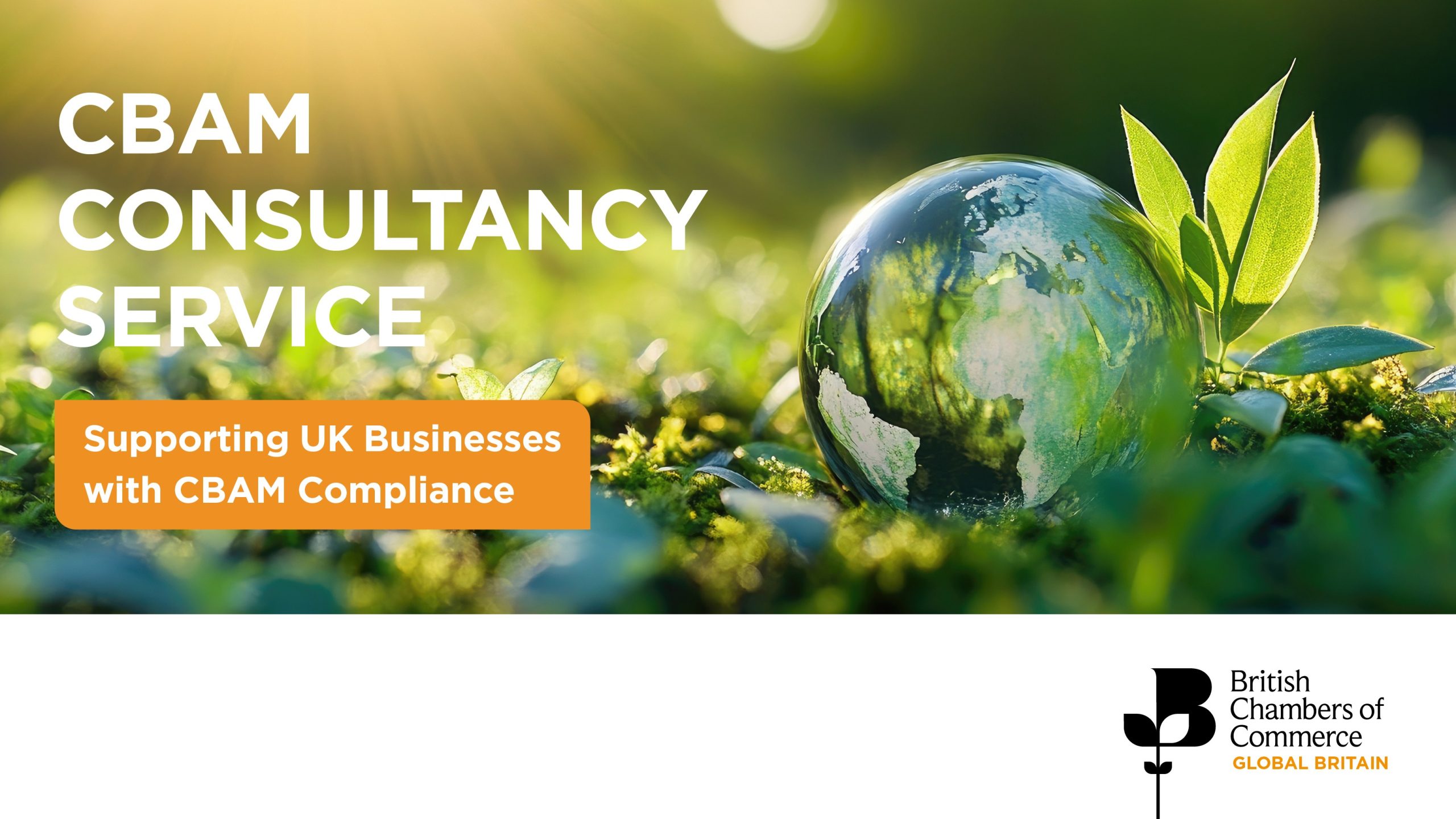Providing key information to help businesses stay compliant and competitive.





CBAM (Carbon Border Adjustment Mechanism)
ChamberCustoms & T1 Transit Docs
Understanding EU CBAM:
What businesses need to know
The European Union’s (EU) Carbon Border Adjustment Mechanism (CBAM) has introduced new compliance requirements for importers bringing certain goods into the EU. These regulations mean that UK exporters must provide accurate emissions data to support their EU customers in fulfilling their reporting obligations.
CBAM applies to carbon-intensive sectors, including:
- Cement
- Iron & steel
- Aluminium
- Fertilisers
- Electricity
- Hydrogen
To maintain a competitive edge and avoid trade disruptions, UK businesses must be prepared to accurately calculate and report emissions data associated with their exports.
How We Can Support UK Businesses
The BCC’s CBAM Consultancy Service provides businesses with expert guidance to navigate the complexities of CBAM compliance.
Our consultancy support includes:
- Tailored CBAM assessments – A specialist will review your operations and supply chain to evaluate the carbon impact of your exported goods.
- On-site or remote consultancy – Work directly with CBAM specialists to establish a compliance framework suited to your business.
- Emissions data reporting solutions – Implement a structured CBAM monitoring system to ensure your EU customers receive accurate and verifiable data.
- Software tools – Businesses will receive an initial 12-month licence for the CBAM software used to track and report emissions effectively.
Why This Matters for UK Exporters
- Ensure seamless trade with EU partners by meeting compliance expectations.
- Reduce compliance burdens for your EU importers, making UK goods more competitive.
- Identify emissions reduction opportunities to enhance sustainability.
- Prepare for upcoming UK CBAM legislation, expected from 2027.
The Carbon Border Adjustment Mechanism (CBAM) is a regulatory measure introduced by the European Union (EU) to prevent carbon leakage and encourage greener global trade practices. By applying a carbon price to imported goods, CBAM ensures that products entering the EU face similar carbon costs to those produced within the EU. This helps level the playing field, reducing incentives for businesses to relocate production to countries with lower environmental standards.
The British Chambers of Commerce (BCC) supports UK businesses in understanding and complying with CBAM regulations through its CBAM Consultancy Service. This service provides exporters and importers with the tools and guidance needed to navigate these evolving requirements.
CBAM primarily affects EU importers, but UK exporters play a key role in the compliance process. From July 2024, EU importers must use actual emissions data instead of default values when calculating the carbon footprint of imported goods. This means UK suppliers must ensure they can:
- Accurately calculate and report embedded carbon emissions in their products
- Provide verified data covering both direct and indirect emissions
- Support EU importers with compliance to avoid delays, penalties, or additional costs
- Without the necessary data, UK businesses risk losing competitive access to the EU market as buyers turn to suppliers who can provide compliant emissions information.
CBAM applies to carbon-intensive industries, including iron & steel, cement, aluminium, fertilisers, electricity, and hydrogen. The compliance process involves three key stages:
- 2023-2025 (Transitional Phase): EU importers must submit quarterly reports detailing the carbon footprint of imported goods.
- July 2024: Actual emissions data must replace estimated default values wherever possible.
- 2026 (Definitive Phase Begins): Importers must purchase CBAM certificates to account for any emissions not covered by a carbon price in the country of origin.
- By 2027, the UK is expected to introduce its own CBAM regulations, making it even more important for businesses to prepare now.
To comply with CBAM, UK exporters must assess the total embedded carbon emissions of their products, including both direct and indirect emissions.
- Direct emissions originate from on-site production activities, such as fuel combustion in manufacturing processes, emissions from chemical reactions, or the generation of heat and steam required for production.
- Indirect emissions come from energy consumption, particularly electricity purchased from external providers. Even if the emissions occur elsewhere (e.g., in power plants supplying electricity), they still contribute to the overall carbon footprint of the exported goods.
Additionally, any carbon tax or emissions cost already paid within the supply chain should be documented and reported.
For UK exporters, ensuring compliance with CBAM is crucial to:
- Providing verified emissions data so that EU importers can meet their reporting obligations
- Maintaining access to EU markets without trade disruptions
- Preparing for similar UK regulations expected to take effect in the coming years
UK exporters have a commercial responsibility to provide accurate emissions data to their EU customers. Without verified information, they risk increased compliance costs, trade delays, or reduced market access in the EU.
EU imports are legally required to:
- Submit quarterly emissions reports until full implementation in 2026
- Purchase CBAM certificates from 2026 onwards to offset the embedded carbon cost of imported goods
The BCC’s CBAM Consultancy Service, helps UK businesses understand, prepare for, and comply with CBAM regulations.
Through this service, businesses receive:
- Expert-led assessments to evaluate their carbon impact
- On-site or remote consultancy to establish a CBAM reporting framework
- Specialist software solutions to track and manage emissions data
By proactively addressing CBAM compliance, businesses can minimise trade risks, maintain seamless EU market access, and position themselves for future regulatory changes.
Assess Your Business’s Readiness for CBAM Compliance
The BCC’s CBAM Health Check Tool is a free, interactive resource designed to help UK businesses evaluate their preparedness for CBAM compliance.
If your business exports to the EU, understanding your carbon emissions reporting obligations is essential for maintaining trade relationships.
How the CBAM Health Check Works
Answer a few quick questions – The tool takes 5 minutes to complete.
Receive a personalised readiness report – Your results are displayed using a traffic light system to highlight:
🔴 Urgent areas requiring action
🟠 Areas needing improvement
🟢 Compliance areas already in place
If further support is needed, businesses can book a free session with a CBAM expert.
Why Use the CBAM Health Check Tool?
- Fast & free – Quickly assess your CBAM readiness at no cost.
- Actionable insights – Identify areas that require immediate attention.
- Specialist support – access BCC’s CBAM Consultancy Service for further guidance.
What the Health Check Assesses
- Your supply chain & market exposure – Do your goods reach the EU?
- Product classification – Are your products within CBAM scope?
- Your carbon emissions knowledge – Are you tracking direct and indirect emissions?
- Customer expectations – Have your buyers requested emissions data?
Next Steps: Get Expert CBAM Support
If your Health Check results highlight areas needing further action, our CBAM Consultancy Service is available to provide tailored support.
Send a message to the Global Trade team.


ChamberCustoms and T1 Transit Docs
Simplify Your Global Trade with ChamberCustoms – your trusted customs partner
Who are we?
At ChamberCustoms, we make international trade simple, compliant, and cost-effective and help businesses of every size navigate complex customs procedures with confidence.
What do we do?
Customs Declarations & Brokerage
Our expert customs team handles import and export declarations, transit documents, and all the formalities needed to move your goods legally and efficiently whether by sea, air, road, or rail. We’re directly connected to HMRC systems and UK ports, ensuring your shipments clear quickly, smoothly, and without unnecessary delays.
Customs Training & Advisory
Empower your team with the knowledge to trade confidently. Our training programmes cover everything from commodity codes, rules of origin, and duty & VAT, to import/export procedures and compliance best practices. Our head office also offers tailored consultancy services, helping you design efficient customs processes and minimise costs and risk.
Compliance & Ongoing Support
We take compliance seriously so you don’t have to worry. Our experts keep you up to date with the latest HMRC regulations and ensure your documentation is accurate, complete, and compliant every time. With transparent pricing and a one-stop service that covers every UK port, you can rely on ChamberCustoms to keep your goods and your business moving.
Why Businesses Choose ChamberCustoms
✅ Direct links to HMRC and UK ports, no third-party delays
✅ Transparent, fair pricing
✅ Full-service customs solution – declarations, training, and advice
✅ Perfect for new or experienced importers and exporters alike
Who We Help?
ChamberCustoms supports UK businesses of all sizes, from first-time exporters to global logistics providers. Whether you’re expanding into new markets, or simply want to streamline your customs operations, our team is here to help you trade with confidence and peace of mind.
Start Trading Smarter – Let ChamberCustoms handle the red tape so you can focus on growth.
📞 Get in touch today to find out how we can simplify your customs process and keep your trade moving forward by calling our team on tel 01329 242420.
We like to know what you think
We constantly strive to improve the products & services we offer and how they are delivered to you. Please let us know what we are doing well and any areas where you think we could be doing better.
Email your comments to info@hampshirechamber.co.uk

